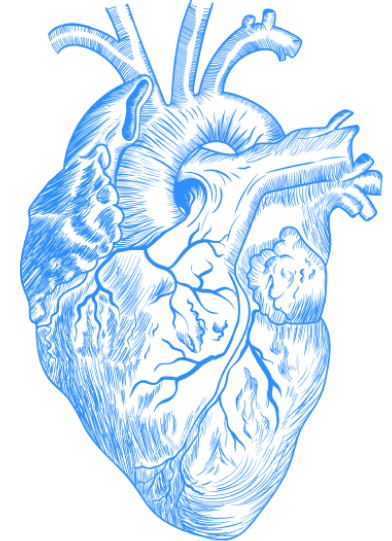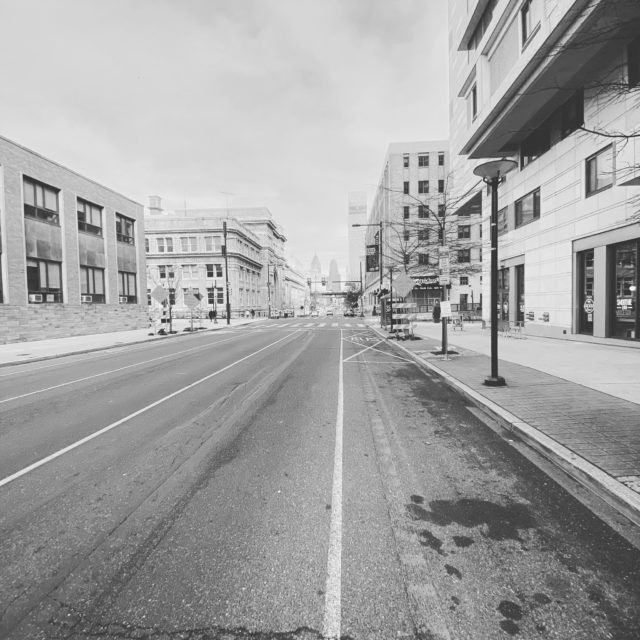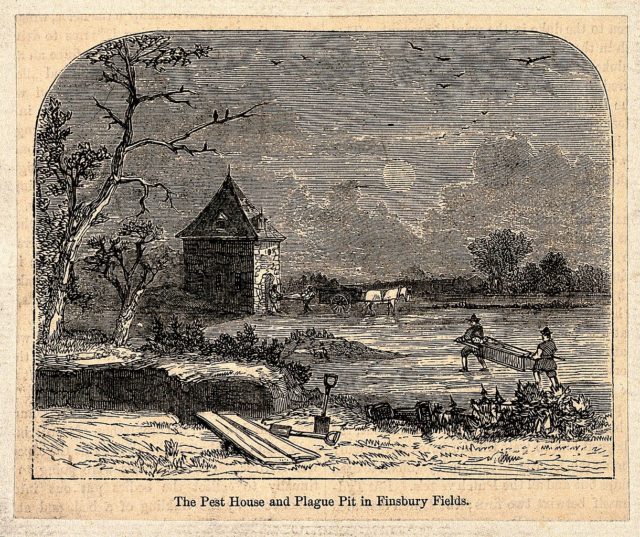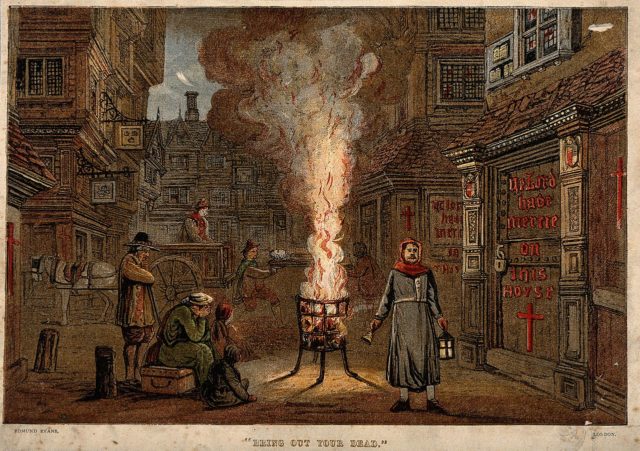
Hostile to the past, impatient of the present, and cheated of the future, we were much like those whom men’s justice, or hatred, forces to live behind prison bars.
From 1665 to 1666, the Great Plague spread through London. Caused by a bacteria transmitted by the bite of a rat flea, it killed nearly a quarter of London’s population in the span of 18 months. Such a deadly conflagration must have seemed strange and terrifying to its victims; there was no germ theory to explain its spread, and the bacteria wasn’t even discovered until the late 19th century. Lack of understanding must have greatly amplified the terror caused by the symptoms: fevers, chills, headache, swollen lymph nodes, gangrenous limbs, and a tortuous journey to the other side. Attempts to ward off the disease included bonfires to cleanse the air, smoking, killing dogs and cats, sniffing sponges soaked in vinegar given to the sick, and bleeding patients with leeches.
In 1722, Daniel Defoe, of Robinson Crusoe fame, published A Journal of the Plague Year. Though he was only around five years old when the plague cast a pall over London, Defoe wrote the book through the eyes of an in-person narrator, based on his collecting of facts, statistics, and journals. What emerges is an imaginative yet historically detailed account of the horror engulfing London. In an introduction to the book, UVA English professor Cynthia Wall writes: “Defoe was fascinated by this history of darkness, pain, and fear…. [H]e was always interested in how human beings behaved under conditions of great stress.”
That question is a perennial one. Plagues always come and go, from smallpox, bubonic plague, and influenza to the coronavirus. Nature often pits species against each other, and during pandemics the simplest organism pits itself against the most complex. In the new coronavirus, many of us bear witness for the first time to a widespread and frightening infectious disease. But the way we behave in the throes of this threat is neither strange nor unprecedented. Despite the advancements in germ theory, our fears, reactions, and actions remain altogether familiar. Some of this is due to the nature of avoiding the disease (isolation and quarantine), but some of this is due to human nature. In reading Defoe’s Journal, one senses his descriptions of the plague could be used for our encounter with today’s Covid-19. Below, I juxtapose my own voice (in regular font) to Defoe’s (in italics) to demonstrate just that.
Only weeks ago I walked home from work and the streets were packed with students, tourists, physicians, professors, campus security, nurses, and others heading out of their offices. I waited on the street corner in a throng of people, and as the traffic light turned green for us, we bolted, as a herd, to the other side. Even when I came to the hospital at night, the music and shouting from undergraduate parties percolated through the crisp wintry air. Now, with a quarantine in place to stop the spread of Covid-19, I walk home alone. It is rush hour and the empty streets offer only the echo of my clogs hitting the ground.

It was a most surprising thing, to see those Streets, which were usually so thronged, now grown desolate, and so few People to be seen in them, that if I had been a Stranger, and at a Loss for my Way, I might sometimes have gone the Length of a whole Street, I mean of the by-Streets, and see no Body to direct me….
Restaurants and bars and construction sites, once bustling and clamorous, have morphed into inhospitable vacancies.
All the Plays and Interludes, which after the Manner of the French Court, had been set up, and began to encrease among us, were forbid to Act; the gaming Tables, publick dancing Rooms, and Music Houses which multiply’d, and began to debauch the Manners of the People, were shut up and suppress’d; and the Jack-puddings, Merry-andrews, Puppet-shows, Rope-dancers, and such like doings, which had bewitch’d the poor common People, shut up their Shops, finding indeed no Trade.
Alas, such closures, even if they are necessary to stem the tide of the virus, come with significant consequences for the economy and human lives. In the United States the number of jobless claims hit a record high, the markets experienced a free fall, the Federal Reserve’s index of financial stress is the highest it has been since the financial crisis over a decade ago. Airlines, hotels, opera houses and others lay off and furlough thousands of workers due to a fall in revenue. Many small businesses and gig-economy workers are now left without a source of income.
Tradesmen and Mechanicks, were…out of Employ, and this occasion’d the putting off, and dismissing an innumerable Number of Journey-men, and Work-men of all Sorts, seeing nothing was done relating to such Trades, but what might be said to be absolutely necessary. This caused the Multitude of single People in London to be unprovided for; as also of Families, whose living depended upon the Labour of the Heads of those Families; I say, this reduced them to extream Misery.
Only the supermarkets bustle with perpetual activity. Even there, however, something unsettles. As I walk in, a hush overtakes the entire floor. The volume of music is lower than usual, few conversations take place, no one speaks on a cellphone. The occasional cacophony of clanging shopping carts drowns out other ambient noises. Some shoppers wear masks and gloves, others don’t. They all rush to complete their shopping, heads down, stealing furtive and suspicious glances at others. Some, outwardly hostile, cut off comrades to get to the avocados or the bananas first. Handmade signs hang throughout the store limiting two milk cartons or two packages of butter per customer, as people scramble to store provisions. Shelves of canned goods lie empty, with the exception of canned beets (even during a pandemic, people haven’t lost their taste).
I must here take farther Notice that Nothing was more fatal to the Inhabitants of this City, than the Supine Negligence of the People themselves, who during the long Notice, or Warning they had of the Visitation, yet made no Provision for it, by laying in Store of Provisions, or of other Necessaries; by which they might have liv’d retir’d, and within their own Houses, as I have observed, others did, and who were in a great Measure preserv’d by that Caution.
As I walk home from the grocery store, those few people left on the street keep their distance from each other and from me. At the hospital, the same sense of anxiety and precaution exists. A nurse coughs in the hallway and everyone walking in his direction about-faces. A patient comes into the emergency room who spent an hour in a New York City airport two weeks prior and, though he is without symptoms, half a dozen phone calls are made to get the patient isolated and tested for Covid-19. We hold conferences by phone or by Zoom, we speak to each other while six feet apart, we all wear masks. We do all this with good reason. How can one know who’s infected and who’s not? Who is the one person who will infect hundreds or perhaps thousands of others? Everyone potentially carries the enemy and we must treat them with caution.
It was a very ill Time to be sick in, for if any one complain’d, it was immediately said he had the Plague. (…)
And when People began to be convinc’d that the Infection was receiv’d in this surprising manner from Persons apparently well, they began to be exceeding shie and jealous of every one that came near them.
Then I say they began to be jealous of every Body, and a vast Number of People lock’d themselves up, so as not to come abroad into any Company at all, nor suffer any, that had been abroad in promiscuous Company, to come into their Houses, or near them; at least not so near them, as to be within the Reach of their Breath, or of any Smell from them; and when they were oblig’d to converse at a Distance with Strangers, they would always have Preservatives in their Mouths, and about their Cloths to repell and keep off the Infection.
Some disagree with strict measures and act as such: spring breakers in Florida, some religious communities who have insisted on gathering in person. Ergo, the virus hit these groups particularly hard.
And tho’ it is true, that a great many Clergymen did shut up their Churches, and fled as other People did, for the safety of their Lives; yet, all did not do so, some ventur’d to officiate, and to keep up the Assemblies of the People by constant Prayers. (…)
And indeed when Men are once come to a Condition to abandon themselves, and be unconcern’d for the Safety, or at the Danger of themselves, it cannot be so much wondered that they should be careless of the Safety of other People. (…)
By the Well, I mean such as had received the Contagion, and had it really upon them, and in their Blood, yet did not shew the Consequences of it in their Countenances, nay even were not sensible of it themselves, as many were not for several Days: These breathed Death in every Place, and upon every Body who came near them; nay their very Cloaths retained the Infection, their Hands would infect the Things they touch’d….
The consequences of ignoring the stay-at-home orders are not just devastating for those we encounter at work or on the street, they are deleterious to our families and friends. In New Jersey, one woman and three of her children died from the virus while other infected family members required ICU care — all likely contracted the disease at a family gathering held on March 10th. One family in rural Georgia faced a similar tragedy after a funeral on Feb. 29th became a “super-spreading event,” causing relatives to fall ill.
They told us a Story of a House in a Place call’d Swan-Alley, passing from Goswell-street near the End of Oldstreet into St. John-street, that a Family was infected there, in so terrible a Manner that every one of the House died; the last Person lay dead on the Floor, and as it is supposed, had laid her self all along to die just before the Fire.
In order to prevent such contagion, family members cannot be with their loved ones in death. Though understandable, this is heartbreaking. I, unfortunately, have seen this with some of our patients. And many have died without family at their side or at their burial, and family members saying goodbye over FaceTime.
I could give several Relations of good, pious, and religious People, who, when they have had the Distemper, have been so far from being forward to infect others, that they have forbid their own Family to come near them, in Hopes of their being preserved; and have even died without seeing their nearest Relations, lest they should be instrumental to give them the Distemper, and infect or endanger them.
Coronavirus has also caused material shortages. Doctors make their own masks, ventilators are in short supply, morgues are overflowing, trenches are dug to bury the dead.
It was a great Mistake, that such a great City as this had but one Pest-House…. I say, had there instead of that one been several Pest-houses…I am perswaded, and was all the While of that Opinion, that not so many, by several Thousands, had died. (…)
I say they had dug several Pits in another Ground, when the Distemper began to spread in our Parish, and especially when the Dead-Carts began to go about, which, was not in our Parish, till the beginning of August. Into these Pits they had put perhaps 50 or 60 Bodies each, then they made larger Holes, wherein they buried all that the Cart brought in a Week, which by the middle, to the End of August, came to, from 200 to 400 a Week…. But now at the Beginning of September, the Plague raging in a dreadful Manner, and the Number of Burials in our Parish increasing to more than was ever buried in any Parish about London, of no larger Extent, they ordered this dreadful Gulph to be dug.

Wikimedia
In the midst of the chaos, fear, and tragedy, some have advertised unproven remedies, sometimes for personal profit. In March, Dr. Vladimir Zelenko used a combination of the antimalarial drug hydroxychloroquine, the antibiotic azithromycin, and zinc sulfate to help patients, saying that one-hundred percent of his patients survived the virus without any hospitalizations. At the time, little was known about the potential effectiveness of hydroxychloroquine for Covid-19 to put much confidence in this; an NIH trial is now underway. Other claims have been more outrageous. The FBI recently arrested Keith Lawrence Middlebrook, an actor who has been charged with soliciting investments in a company claiming to have a cure and prophylactic drug for the disease. And in March, the state of Missouri sued televangelist Jim Bakker for selling a spurious antidote on his show.
On the other Hand, it is incredible, and scarce to be imagin’d, how the Posts of Houses, and Corners of Streets were plaster’d over with Doctors Bills, and Papers of ignorant Fellows; quacking and tampering in Physick, and inviting the People to come to them for Remedies; which was generally set off, with such flourishes as these, (viz.) INFALLIBLE preventive Pills against the Plague. NEVER-FAILING Preservatives against the Infection…. INCOMPARABLE Drink against the Plague, never found out before.
Some resort to thieving. In Australia, some have stolen personal protective equipment and hand sanitizer from hospitals. Others use the pandemic to defraud unsuspecting consumers: the FBI sees a rise in phishing emails from fake charity organizations, the CDC, and airline carrier refund accounts to steal people’s money.
That there were a great many Robberies and wicked Practises committed even in this dreadful Time I do not deny; the Power of Avarice was so strong in some, that they would run any Hazard to steal and to plunder.
Some hospital leaders have been accused in the press of fleeing the chaos, instead of leading from the front.
It is very certain, that a great many of the Clergy, who were in Circumstances to do it, withdrew, and fled for the Safety of their Lives.
In the United States, most of this could have been prevented, and the failure of our leadership to respond swiftly when it had the chance, instead of playing down the threat, will go down in history as a colossal, deadly mistake.
But it seems that the Government had a true Account of [the Plague], and several Counsels were held about Ways to prevent its coming over; but all was kept very private. Hence it was, that this Rumour died off again, and People began to forget it, as a thing we were very little concern’d in, and that we hoped was not true.
Even in the midst of failure and greed, there is hope. While some of our officials were slow to respond, many are demonstrating remarkable leadership and resolve. Dr. Anthony Fauci, the director of the National Institute of Allergy and Infectious Diseases, is one of them. He regularly speaks with all kinds of public figures including basketball stars, talk show hosts, and Silicon Valley executives, to update the public on the virus and the plans of the Covid-19 response team, all while dodging partisan politics. Always well-informed and steadfast, he understands how serious this is and what needs to be done to mitigate it; and he communicates frankly and clearly to his audience. As thanks for this, he received numerous threats and the Department of Health and Human Services beefed up personal security for him. Captain Brett Crozier of the Navy’s USS Theodore Roosevelt disseminated a memo warning Navy leadership about a Covid outbreak amongst his crew on the ship, bringing attention to a deadly scenario. For this act of leadership, unfortunately, the Navy removed him from his post.
But ‘tis true also, that a great many of [the Clergy] staid, and many of them fell in the Calamity, and in the Discharge of their Duty.
Other charitable actions give us hope, too. The government, notwithstanding some dithering, passed a massive financial package to help those affected economically by the virus. While some will undoubtedly need more, this is a good start. And private donors stepped up as well. Whatever one may think of his politics, Sheldon Adelson, a Las Vegas hotel mogul, pledged to pay all his workers for two months despite the brutal economic downturn hitting the hospitality industry. The New England Patriots owner Robert Kraft sent the team plane to China to pick up over 1 million N95 masks and bring them back for healthcare workers. And here is a list of 30 companies donating their proceeds to relief charities. These are just a few of many examples.
The Concern also of the Magistrates for the supplying such poor Families as were infected; I say, supplying them with Necessaries, as well as Physick as Food, was very great, and in which they did not content themselves with giving the necessary Orders to the Officers appointed, but the Aldermen in Person, and on Horseback frequently rid to such Houses, and caus’d the People to be ask’d at their Windows, whether they were duly attended, or not? (…)
Nor was this Charity so extraordinary eminent only in a few; but, (for I cannot lightly quit this Point) the Charity of the rich as well in the City and Suburbs as from the Country, was so great, that in a Word, a prodigious Number of People, who must otherwise inevitably have perished for want as well as Sickness, were supported and subsisted by it.
Difficult times lie ahead. It remains to be seen how successfully we get through the worst and how quickly we will settle back into a relatively normal life. One hopes that it is soon enough to help those in dire economic straights, but not too soon as to cause unnecessary death. I imagine we will one day witness what Defoe described:
It is impossible to express the Change that appear’d in the very Countenances of the People…. It might have been perceived in their Countenances, that a secret Surprize and Smile of Joy sat on every Bodies Face; they shook one another by the Hands in the Streets, who would hardly go on the same Side of the way with one another before; where the Streets were not too broad, they would open their Windows and call from one House to another, and ask’d how they did, and if they had heard the good News, that the Plague was abated.

